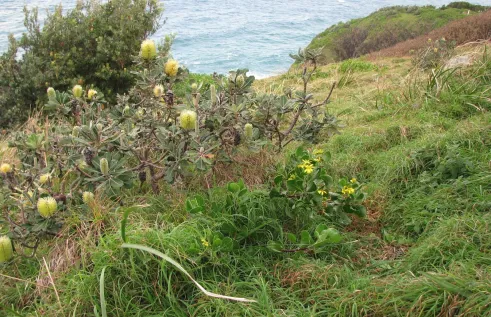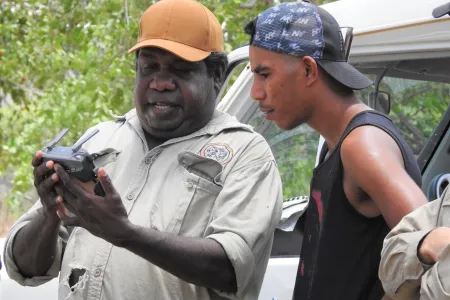News
First Nations-led protocols guiding responsible drone use on Traditional Land
A First Nations-led project focusing on drone use guided by Traditional Owners in Kakadu National Park has developed protocols for responsible and ethical use of drones and other technologies on First Nations owned and managed land in Australia.
A researcher from the Northern Institute at Charles Darwin University (CDU) and the Responsible Innovation Future Science Platform at CSIRO, Dr Jennifer Macdonald, is the lead author of a newly published research paper on First Nations-led responsible innovation to guide drone use in monitoring the biocultural landscape in Kakadu.
Through years of collaboration with Traditional Owners, First Nations ranger groups, researchers at CDU, CSIRO and the University of Western Australia, the team developed protocols for responsible and culturally appropriate use of technology on country through a project funded by the Northern Australia Environmental Resources Hub of the Australian Government’s National Environmental Science Program.
The project is governed by an Indigenous Research Steering Committee and is focused on the development and trial application of Bininj and Mungguy healthy country indicators for monitoring in Kakadu.
“The aim of this project is to enable First Nations rangers and Traditional Owners to use technology to monitor country before and after management interventions to improve the health of country,” Dr Macdonald said.
“It is a collaborative research project that is empowering Traditional Owners to design and implement responsible technology use to monitor indicators of healthy country.”
Some of the technologies currently used to monitor the health and biodiversity of First Nation lands include drones, motion sensor and video cameras.
Drones offer exciting technical possibilities such as producing accurate wildlife and flora monitoring data and visualising hard-to-reach or inaccessible locations. But limited work has been done to make sure drones can be introduced responsibly.
“Digital tools can enable people to make faster decisions about emerging and escalating threats to their country, and drones are widely used to understand what’s happening during management interventions,” Dr Macdonald said.
“We need to think about how technology can help us care for country and manage issues such as weed invasion and fires. But we also need to be careful how we do that in a responsible and culturally respectful way.”
“The question to think about is how could we design and use digital technologies from an ethical position that prioritises First Nation perspectives and knowledge practices?”
One of the key approaches of the project is empowering First Nations people to lead the process and co-develop the guidelines.
“We need to build trust and relationships and focus on benefitting Traditional Owners moving forward to the future,” Dr Macdonald said.
Related Articles

Nanoplastics hindering cognitive abilities of fish, international research shows
Nanoplastic exposure can impair the cognitive abilities of fish and could lead to significant impacts on marine species’ ability to survive, according to a new international study.
Read more about Nanoplastics hindering cognitive abilities of fish, international research shows
New project to grow Indigenous aquaculture on one of Australia’s largest islands
An Australian island’s efforts to improve food security and transition into a blue economy will be bolstered by a new project to propagate a nutritious and increasingly popular fish.
Read more about New project to grow Indigenous aquaculture on one of Australia’s largest islands
Potential for satellites and AI to help tackle critical invasive species problem
Satellite imagery and artificial intelligence can detect with high accuracy two invasive weed species in Australia, posing a new opportunity for defense against these pervasive plants.
Read more about Potential for satellites and AI to help tackle critical invasive species problem
